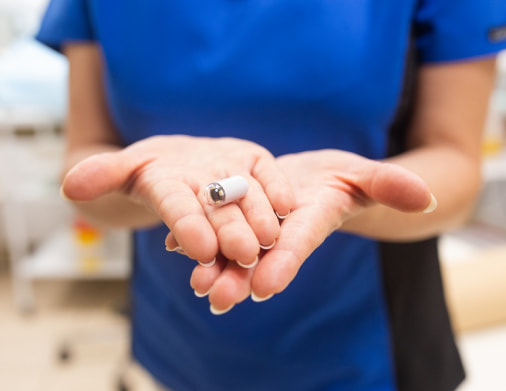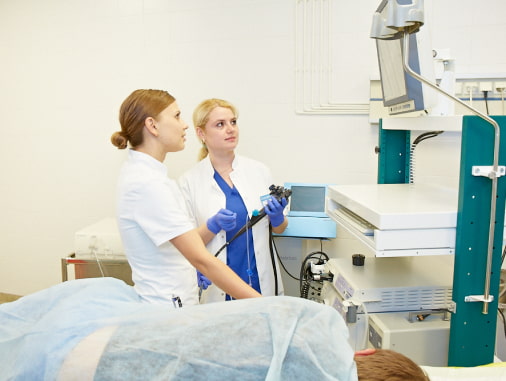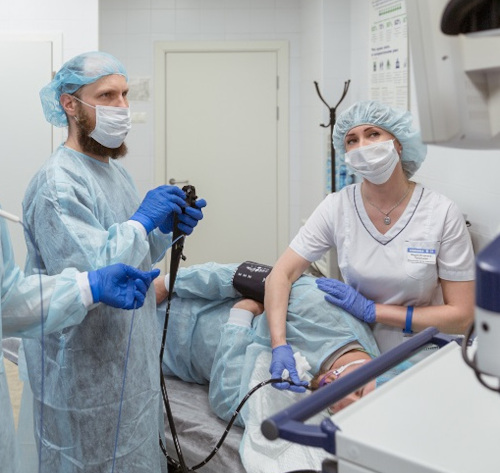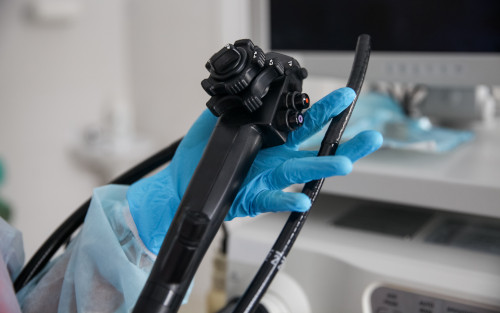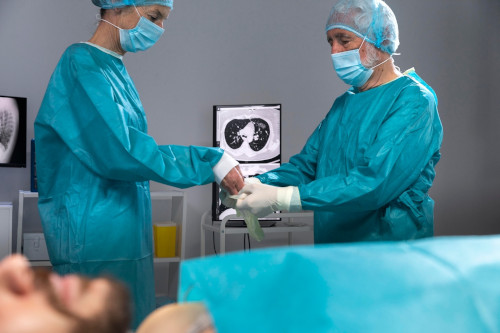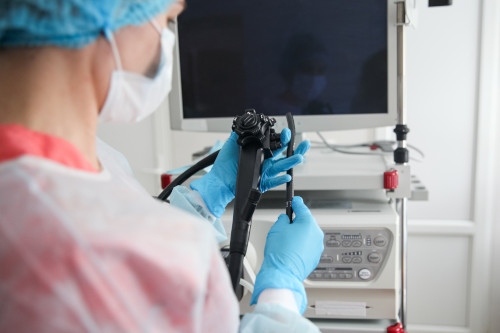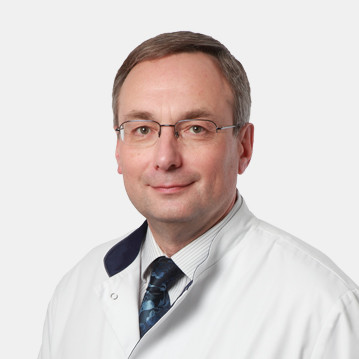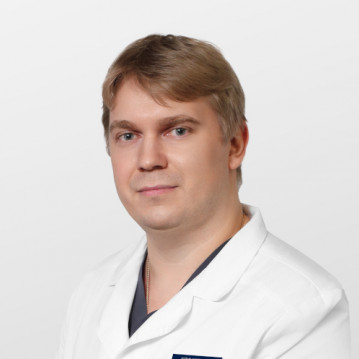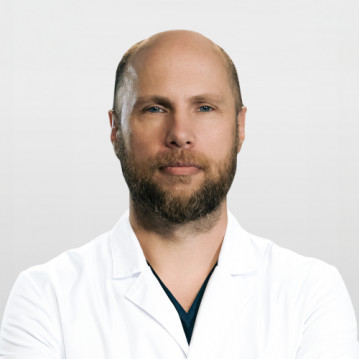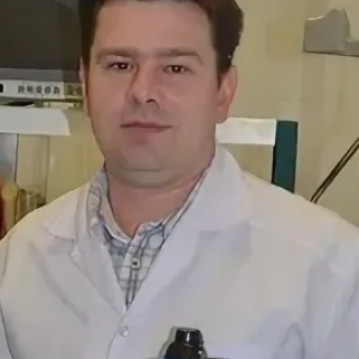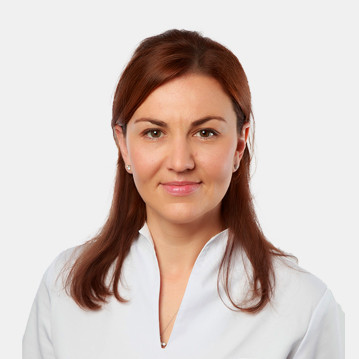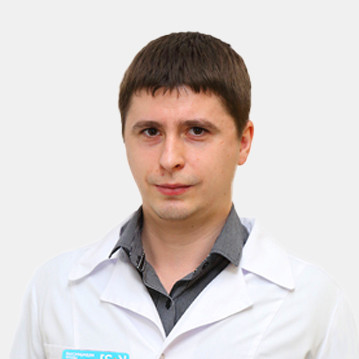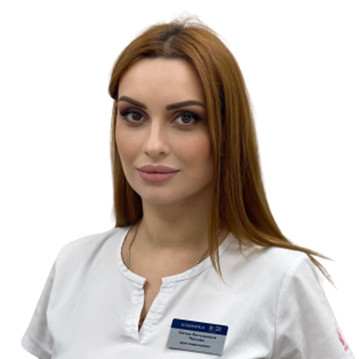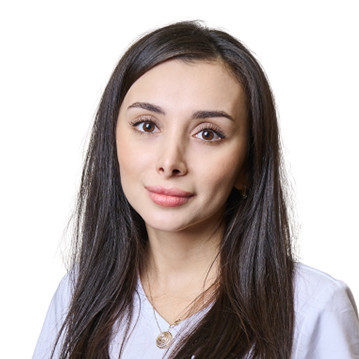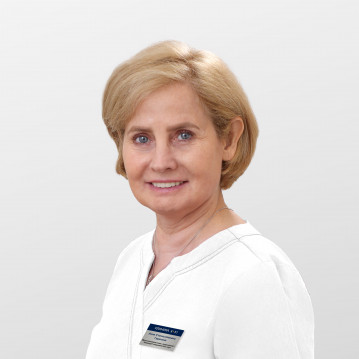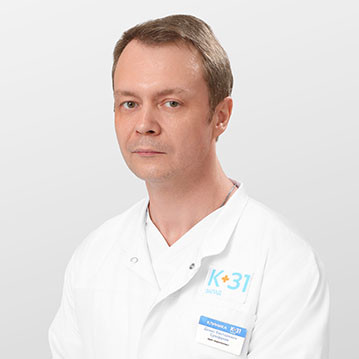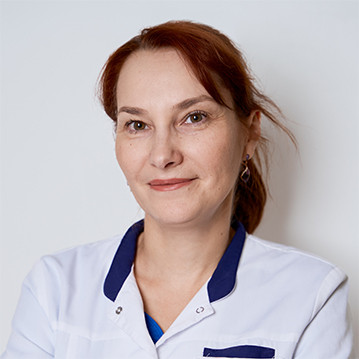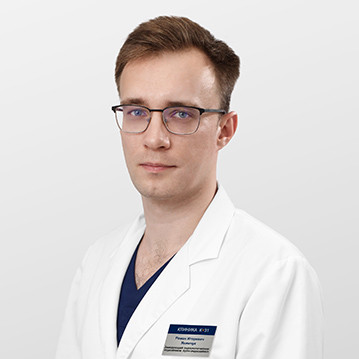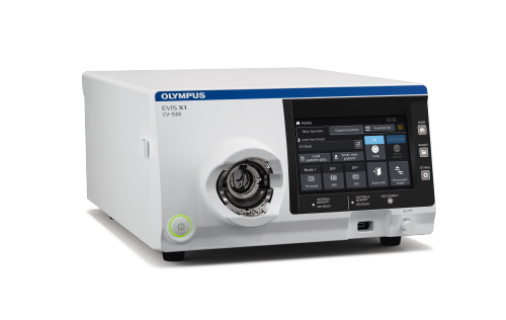В К+31 работают врачи-эндоскописты имеющие большой опыт выполнения, как высококлассной диагностики, так и широкого спектра эндоскопических лечебных манипуляций, в том числе под седацией (во сне).
Эндоскопическое отделение обеспечивает высокоэффективную диагностику и лечение заболеваний: органов желудочно-кишечного тракта (пищевода, желудка, тонкой и толстой кишки), панкреатобилиарной зоны (протоковых систем желчного пузыря и поджелудочной железы), трахеобронхиального дерева. Применение эндоскопических методик осмотра с увеличением, в режиме узкого спектра света (NBI) и хромоскопии значительно расширяет диагностические возможности, позволяя увидеть малейшие изменения слизистой оболочки. Своевременно и качественно выполненная эндоскопия позволяет выявлять изменения на ранних стадиях, тем самым предотвращая развитие запущенной стадии заболеваний, в том числе, онкологических.
Современное оборудование в К+31 позволяет выполнить качественное исследование и создать максимально комфортные условия для пациента, минимизировав при этом неприятные ощущения от процедуры. При повышенной чувствительности, страхе, низком болевом пороге, мы можем провести исследование с анестезией (седацией) под контролем высококвалифицированной команды анестезиологов.

специалисты

эндоскопы

эндоскопических процедур
Видеокапсульная эндоскопия – это современный метод обследования кишечника.
Данная диагностика позволяет досконально изучить изнутри тонкий (капсульная энтероскопия) и толстый (капсульная колоноскопия) кишечник совершенно:
- безболезненно;
- неинвазивно;
- незаметно для пациента;
- без отрыва от повседневной жизни.
В К+31 любое эндоскопическое исследование можно провести в максимально комфортных условиях седации – 10-минутного лекарственного сна.
Это абсолютно безопасно, т.к. современные препараты, созданные специально для этой цели, не относятся к наркотическим анальгетикам. Врач-анестизиолог К+31 осуществляет индивидуальный подбор препарата и контролирует процедуру на всех ее этапах.
Пациент во время процедуры спит, не испытывая никаких неприятных ощущений. После пробуждения полностью отсуствует дискомфорт и уже через 30 минут можно возвращаться к своим обычным делам.
Особенности исследования в К+31
Все эндоскопические стойки обеспечены возможностью выполнения видеозаписи исследований и захвата изображений.
В каждый протокол включаются фотоизображения основных анатомических областей и изменений, выявленных в ходе исследования; в эндоскопической базе имеется видеоархив, который очень удобен для постоянно наблюдающихся пациентов.
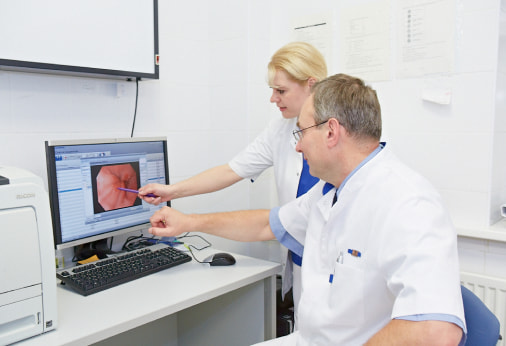
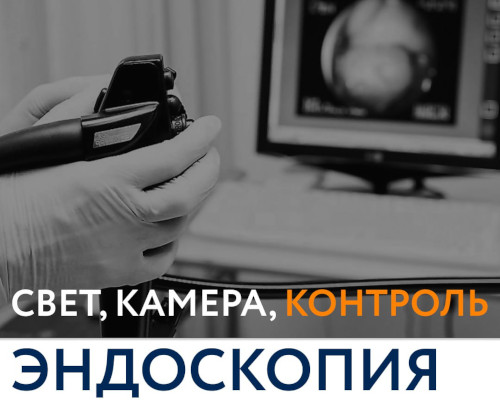
Вы уже провели эндоскопическое обследование толстой кишки?
Знаете ли вы, что существует руководство, в котором содержатся рекомендации Европейского общества гастроинтестинальной эндоскопии? Это основной документ, по которому можно понять, качественно ли выполнена эндоскопия.
Одними из главных показателей качественно выполненной колоноскопии, согласно данному руководству, являются:
- Частота выявления аденом (ADR): аденома — это доброкачественная эпителиальная неоплазия толстой кишки, сопряжённая с высоким риском трансформации в рак, т.е. является предраковым состоянием. Своевременное удаление аденомы в ходе колоноскопии спасает пациента от рака в будущем. Согласно руководству, частота выявления аденом должна быть не менее 25%, причем при возрастании этого показателя на 1% риск пропущенного колоректального рака снижается на 3%, а смертность от него сокращается на 5%. В К+31 на Лобачевского показатель частоты выявления аденом соответствует 31%!
- Частота выявления полипов (PDR): данный показатель — это отношение числа колоноскопий, при которых выявлен один или несколько полипов (любого гистологического типа, в том числе зубчатые образования) к общему числу выполненных колоноскопий. Выявление зубчатых образований крайне трудно, так как в большинстве своем это плоские новообразования, не возвышающиеся над слизистой оболочкой. Но при этом они также как и аденомы имеют потенциал трансформации в рак. Благодаря тому, что в К+31 на Лобачевского мы используем самую современную и уникальную эндоскопическую видеосистему экспертного уровня Olympus EVIS X1, показатель частоты выявления полипов соответствует 51%, то есть у каждого второго пациента мы выявляем новообразования толстой кишки.
- Частота достижения купола слепой кишки (CIR): показатель, определяющий общее число колоноскопий, при которых эндоскоп был проведен в купол слепой кишки, то есть была проведена тотальная колоноскопия. Согласно руководству, данный показатель должен быть равен 90%. Благодаря колоссальному опыту эндоскопической команды и современному оборудованию, в К+31 на Лобачевского показатель частоты достижения купола слепой кишки соответствует 98% случаев!
В 2023 году в К+31 на Лобачевского было проведено 2377 колоноскопий, при этом эндоскопическое удаление применялось в 1426 (60%) случаях из них. Благодаря высокому уровню профессионализма эндоскопической команды и современному оборудованию, у нас не было ни одного случая осложнений после удаления новообразований за 2023 год.
Не откладывайте заботу о своем здоровье на потом. Рак на ранних стадиях не болит. Благодаря качественно выполненной колоноскопии, можно обнаружить и удалить новообразование на предраковой стадии, не доводя до тяжелого заболевания!

Записаться на эндоскопию

Такая награда выдаётся клиникам с самым высоким рейтингом по оценкам пользователей, большим количеством обращений с данной площадки, при отсутствии критичных нарушений.

Такая награда выдается клиникам с самым высоким рейтингом по оценкам пользователей. Она означает, что место знают, любят и сюда точно нужно зайти.

Портал ПроДокторов собрал 500 тысяч отзывов, составил по ним рейтинг врачей и наградил лучших. Гордимся, что среди награжденных есть наши врачи.
Комплексные программы
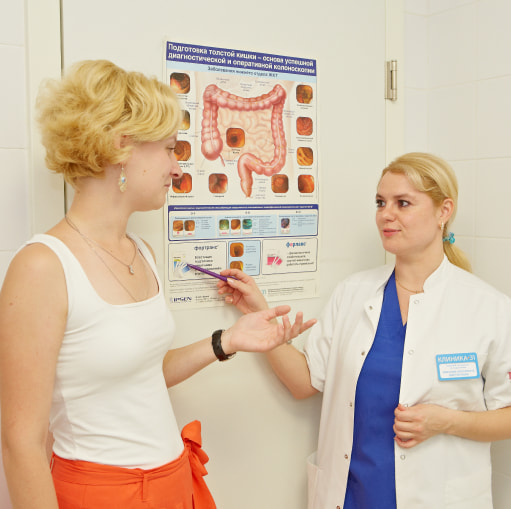
Чтобы результат исследования был максимально информативным, эндоскопия должна выполняться на пустой желудок. Перестать принимать твердую пищу нужно за 12 часов до планируемой эндоскопии. Также за 2 часа перестать пить любые жидкости – даже обычную воду. Эта рекомендация позволит провести эндоскопию желудка либо разных отделов кишечника без боли. Диагностика или лечение в поликлинике пройдут с комфортом.
В зависимости от состояния ЖКТ и симптоматики, перед эндоскопией врач может назначить проведение процедур очищения кишечника. Вы можете принять рекомендованное слабительно средство либо же понадобиться выполнение очистительной клизмы. Чтобы процедура прошла без боли, выполнить очищение нужно через 5-6 часов после ужина. Оптимально делать клизму перед сном. Такие рекомендации даются врачом, если проводится эндоскопия нижних отделов кишечника.
Стоимость
Ответы на популярные вопросы
Есть ли какие-то ограничения по питанию за день до процедуры?
К любой эндоскопии надо готовиться, и гастроскопия – не исключение. Перед исследованием необходимо ограничить прием пищи. Если гастроскопия проводится утром, то последний прием пищи рекомендуется вечером, не позднее 19 часов, хотя прием жидкостей до сна не ограничен. Утром надо быть натощак. Если следовать этой рекомендации, желудок во время процедуры будет пустым, что даст возможность провести информативное исследование и получить достоверные результаты.
А что насчет питья?
Если человек идет на гастроскопию, то лучше не пить за несколько часов (минимум за 2 часа), иначе в желудке будет слишком много жидкости, которая ухудшит визуализацию. Помимо этого, во время исследования люди могут вести себя по-разному: случайно срыгнуть, закашлять, или начать тужиться. Из-за этого повышается внутрибрюшное давление, и содержимое желудка может попасть из пищевода через вдох в дыхательные пути, повышая риск осложнений.
Может ли кишечник “сжаться от страха” и усложнить процедуру?
Да, это возможно. Под действием эмоциональных факторов может произойти спазм. Кишка сжимается. Если это происходит, мы пытаемся ее расправить, вводя газ или воду в просвет. Мы это видим по характерной белесой слизистой спазмированных складок кишки, которые могут затруднять проведение исследования. Ухудшается видимость, за складками можно не заметить новообразование или неглубокое изъязвление.
Чтобы этого не происходило, стоит провести премедикацию или ввести спазмолитик, а ещё лучше, чтобы не возникало страха, следует провести исследование с внутривенной анестезией – во сне.
Сколько времени занимает процедура?
Стандартная эзофагогастродуоденоскопия занимает 10-15 минут.
Как быть, если захочется сглотнуть во время процедуры?
Об этом переживать не стоит. Во время исследования голова пациента укладывается таким образом, чтобы слюна могла пассивно стекать через уголок рта. Если человек сглотнет, он почувствует аппарат, и могут возникнуть рефлексы. Это нежелательно, но не страшно. Процедура продолжится, когда пациент успокоится.
Может ли выпитая за сутки таблетка обезболивающего повлиять на результаты исследования?
Если за день до гастроскопии у вас разболелась голова и пришлось выпить таблетку, то это никак не повлияет на исследование.
Последствия приема анальгетиков становятся видимыми, если принимать их на регулярной основе. В этом случае во время гастроскопии мы зачастую диагностируем эрозивно-язвенные изменения слизистой оболочки желудка.
Во время диагностического исследования «во сне» пациент находится под действием обезболивающего, будет ли больно после?
Если вмешательство проходило гладко и без осложнений, боли и дискомфорта быть не должно.
А вот если был повышенный тонус кишечника, и исследование выполнялось с введением воздуха, то пациент может проснуться с ощущением распирания или вздутия кишки. В нашей клинике мы проводим эндоскопию с использованием углекислого газа (CO2), который быстро рассасывается, и неприятных ощущений после исследования пациент не ощущает.
Когда можно будет поесть после процедуры?
После гастроскопии без анестезии можно сразу же пить и кушать. Если использовался лидокаин, то рекомендуется подождать 10-15 минут, пока не пройдет местная анестезия.
